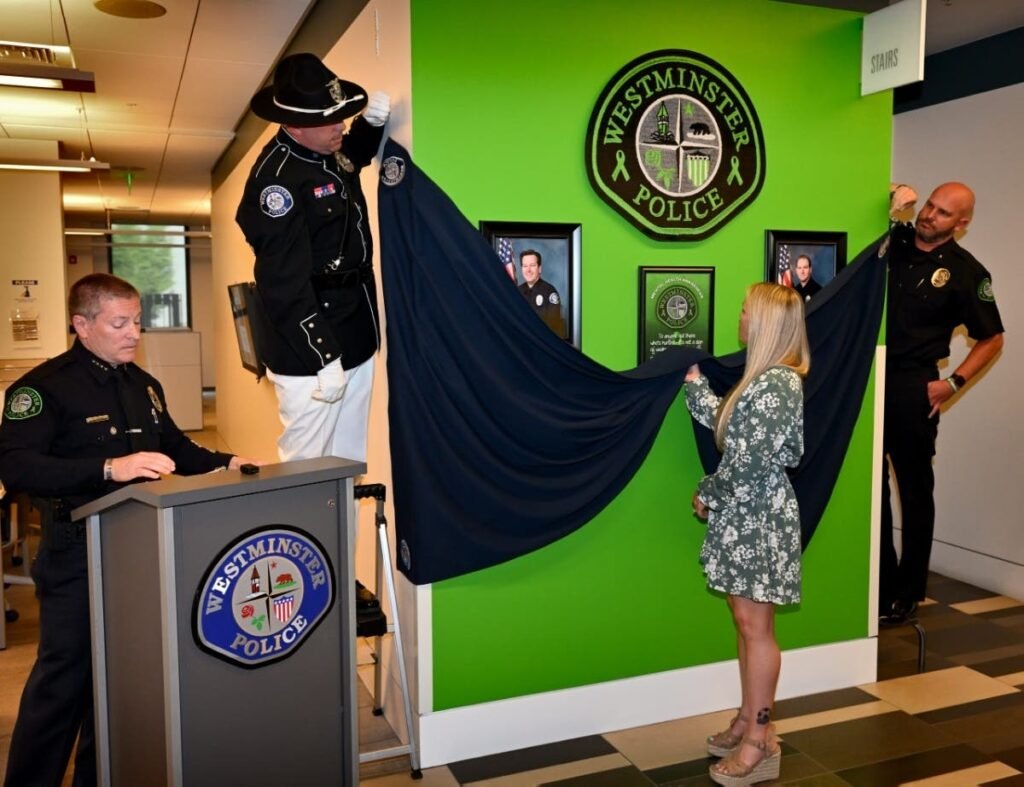Mental Health Awareness in Law Enforcement: Honoring Fallen Officers and Addressing Suicide Stigma
The tragic deaths of former officers Sgt. Tom Richard and Officer Ken Pate have galvanized the Westminster Police Department (WPD) in its efforts to advocate for mental health awareness and suicide prevention. With both officers succumbing to self-inflicted wounds more than a decade ago, the department has dedicated itself to addressing a vital issue that plagues many first responders. At the commencement of Mental Health Awareness Month, a poignant ceremony was held, unveiling a mounted green shoulder patch alongside portraits of Richard and Pate, with an inspiring message: “To anyone out there who’s hurting, it’s not a sign of weakness to ask for help, it’s a sign of strength." This initiative not only honors the memory of these fallen officers but symbolizes a commitment to breaking down the stigma surrounding mental health issues in law enforcement.
A Colorful Tribute: Green for Growth and Renewal
The color green, representing new growth and beginnings, covers the wall where the officers’ portraits are displayed. This vibrant reminder that it is acceptable to seek help marks a significant shift in the culture within the police department. Throughout May, WPD officers will wear green shoulder patches, while staff will receive green ribbons and lapel pins to signify their commitment to mental health awareness. This public display is part of a larger conversation about managing the mental health challenges that come with public service. Various other officers have fallen under tragic circumstances, including Lt. Ronald Weber, Officer Steven Phillips, and Sgt. Marcus Frank. These names are memorialized at the Westminster Police Officers’ Memorial, serving as somber reminders of the inherent risks associated with police work, including the hidden struggles with mental health.
The Complexity of Mental Health Issues
Despite the ongoing efforts to destigmatize mental health discussions, many officers still grapple with their struggles in silence. Dr. Heather Williams, a mental health specialist for first responders, emphasizes the unique pressures of being in law enforcement, where officers are routinely exposed to trauma. The widespread issues of PTSD and depression within police ranks reflect the need for better mental health support systems. Chief Darin Lenyi also noted the pressing issue of mental well-being, indicating the high rates of divorce and substance abuse among officers. As Carrie Atkinson, Richard’s widow, poignantly pointed out, the death of her husband left profound impacts, not only on her but also on their four children.
A Call for Action: Seeking Help
The theme of asking for help resonates throughout the department, evidenced by Atkinson’s heartfelt message to officers in distress: “You don’t want to lose someone and then see someone like me standing here.” The challenges of police work create an environment where mental health issues often fester. Seeking help is often overshadowed by fear or denial, leading to disastrous consequences. Steve Hough, co-founder of Blue H.E.L.P., highlights the necessity for departments to prioritize mental health resources for officers. Initiatives like the Law Enforcement Mental Health and Wellness Act have recently gained traction, supporting funding for mental health projects aimed at improving the wellbeing of first responders.
The Stigma Surrounding Suicide in Law Enforcement
Despite increased awareness, discussions surrounding suicide remain taboo. Cmdr. Cord Vandergrift reflects on the painful reality: "It’s a dirty little secret this profession has." With 160 police suicides recorded in 2022, the numbers demonstrate a hidden epidemic that remains underreported. A tragic element of this issue is the reluctance of the law enforcement community to recognize suicides as line-of-duty deaths. Families of suicide victims often struggle to access benefits and support due to societal stigmas and the lack of acknowledgment surrounding mental health struggles. Hough and his team are working tirelessly to bridge these gaps, yet progress is painful and slow.
Honoring Richard’s Legacy and the Pursuit of Change
Tom Richard’s story underscores the complexities of mental health in law enforcement. Despite being a strong advocate for mental health awareness and establishing the Trauma Support Team in WPD, he ultimately succumbed to his own demons. His experiences, both personal and professional, illustrate the profound psychological toll that police work can inflict. As Atkinson reflects on Richard’s tragic path, the irony that someone so dedicated to helping others could not save himself offers a poignant lesson for the community. Advocating for mental health should encompass not just awareness but also proactive measures to support officers before they reach a breaking point.
Conclusion: A Continuing Conversation
As Mental Health Awareness Month progresses, the Westminster Police Department’s efforts remind us that discussions on mental health are vital in breaking down barriers for officers. The unveiling of the shoulder patch and the surrounding events serve as a clarion call for mental health advocacy. Resources and community support are essential to addressing these challenges effectively. As we honor the legacy of fallen officers like Tom Richard and Ken Pate, we must continue to advocate for an environment where mental health issues can be addressed openly without shame. By doing so, we move closer to a system that not only recognizes the struggles faced by our first responders but actively supports their mental well-being.
For more resources on mental health in law enforcement, visit Blue H.E.L.P. to learn about their initiatives and support services.





